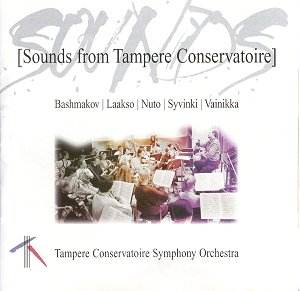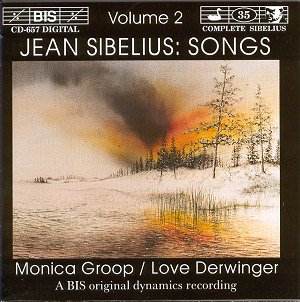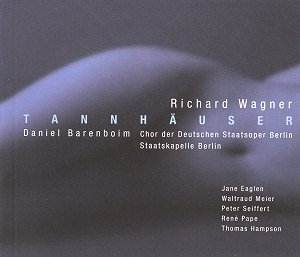 Composer: Various
Composer: Various
Works: Jussi-Pekka Nuto: Clap (1997); Ilari Laakso: Concerto for Cello and Orchestra (1992); Leonid Bashmakov: Clarinet Concerto (1990); Sakari Vainikka: Trumpet Concerto (1985); Esko Syvinki: Piano Concerto No.1 Op.4 (1978)
Performers: Lauri Voipo (cello), Pekka Ahonen (clarinet), Aki Välimäki (trumpet), Hikka Servo-Junttu (piano), Tampere Conservatoire Symphony Orchestra, Tuomas Pirilä, Juha Törmä
Recording: Tampere Conservatoire Hall, February 1999
Label: BIS
The double-CD set “Sounds from Tampere Conservatoire” presents a compelling survey of contemporary Finnish music, spotlighting composers closely linked to the Tampere Conservatoire. This collection serves not only as an introduction to emerging voices but also offers a glimpse into the evolution of Finnish orchestral music. The featured works range from the youthful exuberance of Jussi-Pekka Nuto to the more established Leonid Bashmakov, each contributing to a rich tapestry that reflects the diverse influences and traditions shaping Finnish composition.
Nuto’s “Clap” stands as the most recent work, embodying a youthful exploration of orchestral texture and rhythm. While its stylistic identity appears somewhat nebulous—echoing Stravinsky’s “Rite of Spring” during its quieter passages—it demonstrates a notable command of orchestration. The piece oscillates between moments of exuberance and introspective pauses, though it occasionally falters in coherence. The orchestral execution, albeit fresh and enthusiastic, reveals a certain lack of refinement, particularly in the string section, which could benefit from greater depth and warmth.
Ilari Laakso’s single-movement “Concerto for Cello and Orchestra” offers a more ambitious structure, transitioning through various thematic sections. The work begins tentatively but truly soars midway, culminating in a breathtaking finale that showcases not only the cellist Lauri Voipo’s expressive capabilities but also Laakso’s lyrical prowess. The abrupt ending, while striking, leaves the listener yearning for further development, highlighting the composer’s potential for creating more cohesive musical narratives.
Bashmakov’s “Clarinet Concerto,” a standout on this recording, is a multifaceted exploration of color and emotion. Its blend of contrasting sections showcases both melodic richness and dramatic depth. Pekka Ahonen’s clarinet performance exemplifies technical skill and interpretative insight, navigating the work’s demanding passages with grace. Bashmakov’s ability to balance lyricism with a more dramatic intent makes this concerto a commendable addition to the clarinet repertoire, deserving of wider recognition.
Sakari Vainikka’s “Trumpet Concerto” emerges as a contemplative piece that emphasizes the trumpet’s lyrical qualities rather than its technical bravura. Aki Välimäki delivers an eloquent performance, capturing the elegiac mood of the work, which resonates with a profound sense of introspection. Vainikka’s writing is rich in melodic content, and while the work may lack the exuberance typically associated with trumpet concertos, its meditative qualities provide a refreshing contrast.
Esko Syvinki’s “Piano Concerto No.1 Op.4” rounds out the collection with its five-movement structure, showcasing a blend of traditional and contemporary idioms. Hikka Servo-Junttu’s piano playing is robust and assured, navigating the diverse moods with dexterity. The incorporation of a slow introduction leading into lively sections provides a satisfying architectural coherence, reminiscent of Prokofiev’s style, yet distinctly personal.
The recording quality, captured at the Tampere Conservatoire Hall, reflects a commendable balance, though certain orchestral sections, particularly strings, occasionally sound undernourished. The student orchestra plays with commendable dedication and spirit, but the overall sound could benefit from a more polished ensemble blend. Despite these limitations, the performances radiate enthusiasm and commitment, making the collection an engaging listen.
This release serves as a significant reminder of the wealth of talent emerging from Finnish conservatories. While some pieces may reveal inconsistencies, the overarching quality of the compositions and performances makes this collection a noteworthy exploration of contemporary Finnish music. The Bashmakov and Vainikka works particularly stand out, meriting further exploration by enthusiasts and newcomers alike, showcasing the vibrancy and depth of the Finnish musical landscape.



